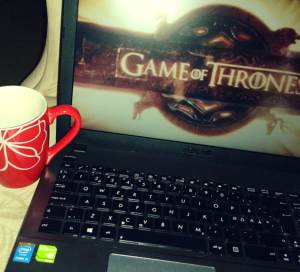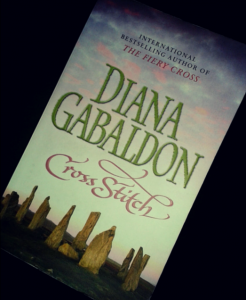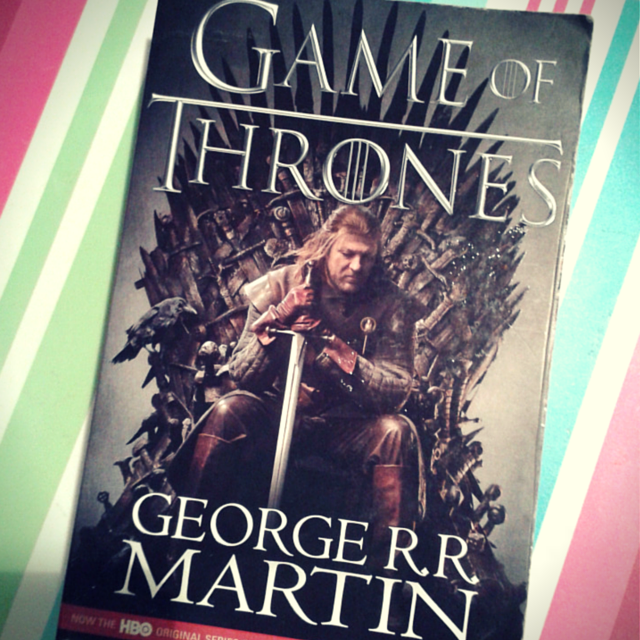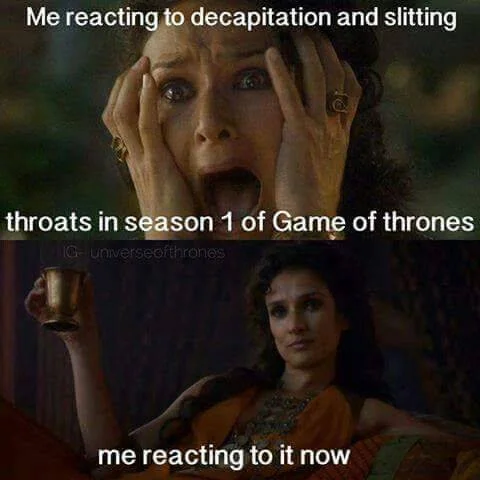Outlander, the new fantasy-romance series on Starz, can’t be described without sounding at least slightly ridiculous: a nurse from the World War II-era time-travels back to 18th century Scottish highlands through a sacred stone circle, and ends up captive in a Scottish laird’s castle. Plus there’s a massive amount of hot sex and mind-boggling violence. The series, created by the Battlestar Galactica show runner Ronald D. Moore, falls mostly into adventure genre with bits of romance, fantasy and historical fiction thrown in for good measure. It’s no wonder then, that comparisons to the HBO hit series Game of Thrones arose quickly after the show premiered and critics have been comparing the two ever since.

Game of Thrones, a fantasy show based on the book series A Song of Ice and Fire, has already been running for several seasons, during which it has been accused of gratuitous sexposition: naked bodies working as the background for crucial information about the events of the show. It’s undoubtedly common that shows – not just Game of Thrones, although it is a fine example of this – don’t offer much in the means of active female agency but rather use the female characters to satisfy the so-called male gaze. Sometimes, contrary to common sense, Game of Thrones has also been celebrated for its selection of “complex” female characters. Too bad these characters are usually raped, harassed, objectified, abused, and killed off as soon as they start showing some potential growth into major characters. Clearly, one has to control at least an army but preferably a few dragons, if one is to survive in Westeros. None of the agency that a complex female character is expected to possess can be seen on screen.
Outlander, on the other hand, first started as historical fiction books penned by Diana Gabaldon and marketed as romance novels as those were more likely to sell well. Now, the series is more aligned with general fiction and the show has clearly tried to distance itself from too much romance fluff as well. The complexity of the story involves so much more than just the sex – no matter how hot it might be – and that seems to be the angle the creators of the show are pushing in order to attract the male populous. The amount of sex and violence might parallel that of Game of Thrones but the point of view is completely different: instead of sexposition and objectification of female bodies, Outlander is firmly feminist in its attitude toward sex and gender. The male gaze of most shows turns to female gaze as we watch the wedding night scene of episode 7, season 1, and see the heroine of the show slowly caress every bit of skin on the handsome devil that is Jamie Fraser, the love interest and women’s wet dream in the show.
The lead character in Outlander is Claire: a stubborn, headstrong, smart, and compassionate woman. She is sexual – very much so, as the series will show – but she is not sexualized. Her sexuality is a big part of who she is, but it doesn’t define her and she is not reduced into that one aspect of her persona. She is used to act on her own desires and wishes, due to her previous responsibility and independence during the wartime. There is none of the laziness associated with many of those (quite common) “strong” female characters, who are merely written as men. Well – men with breasts. Claire isn’t the only strong female character: Geillis, a strong-willed “witch”, befriends the heroine quite quickly – perhaps due to being kindred spirits. We also have a chance to fall in love with the tough but fair cook Mrs. Fitz, who seems to take life by the balls – and probably men too, if necessary.
Outlander does, of course, have its faults as well: rape seems to be the hammer of feminism that is pounded on the viewer’s head every time the heroine is seen as being the victim of patriarchy in any way. After having the threat of rape loom in the horizon pretty much in every episode, the set-up quickly grows old. Surely rape isn’t the only negative that comes from male-dominant culture? (Of course, this shows quite a bit of loyalty to the original book while Game of Thrones actually changed some of the consensual sex scenes into rapes or otherwise very unpleasant acts in the television series.)
Outlander also very clearly steers the viewer into accepting that while Claire is an independent and strong woman, she is also very tempted to give into the ideas of a traditional heteronormative relationship and a man of her own who will protect her from the dangers of the world. Jaime, Claire’s future (or past – or current – it’s so hard to tell when time travel is involved!) husband, is clearly the love interest who is meant to tie Claire into bonds of marriage (or bonds in general), but at least their relationship seems fairly equal. She hasn’t gotten decapitated or smacked around (too much) by him yet. It’s better than her would-be fate if she were to step foot into the Lannister court.
The fear currently connected with Outlander is that it will fail if the men don’t tune in. But women are a driving demographic in cable television and female-driven shows can be just as big of a success. Thus, with any luck, Outlander will prove its doubters wrong, and we can enjoy watching Claire getting, ahem, serviced by men for many seasons to come. I’ll leave you with one of the quotes from Claire that will – hopefully – leave all you feminists out there going huzzah: “Is there ever a good reason for rape, Master MacKenzie [laird of the castle Claire is being held captive]?”


